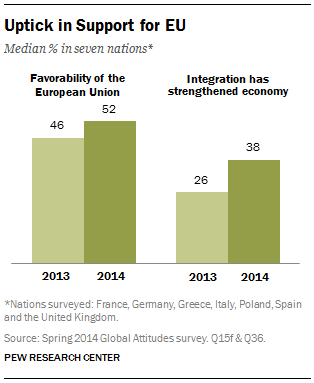
Support for the European Union may be rebounding just in time for the European Parliament elections, according to a new survey of seven EU nations by the Pew Research Center. After a dramatic decline in the wake of the euro crisis, EU favorability is now on the rise in France, the United Kingdom, and Germany. And faith in one of the EU’s founding principles – that European economic integration is good for their own country – is up in the UK, Poland and Germany.
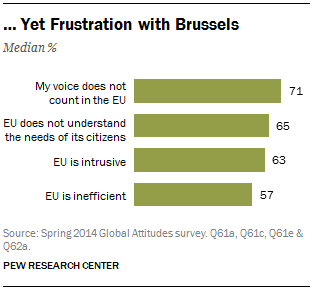
But, as the electorate heads to the polls beginning May 22, publics across Europe overwhelmingly think that their voice is not heard in Brussels, home to the EU. Majorities in most countries complain that the EU does not understand their needs and is intrusive and inefficient. And they express little enthusiasm for giving the EU greater power on economic issues.
Moreover, in most of the countries surveyed, ratings for the EU have yet to return to pre-crisis levels. Italians are increasingly critical of the institution and are divided over whether to keep using the euro as their currency. And Greeks, who have suffered most from the economic downturn, remain deeply skeptical of many aspects of the European project.
Meanwhile, conflicting politics complicate the upcoming European Parliament elections. In the United Kingdom, Italy, Poland and Germany, people on the right of the political spectrum are generally more judgmental of the EU. In Greece and Spain, the institution’s strongest critics are on the left. And concern about immigration adds to the public’s disgruntlement. Majorities in Italy, Greece, France and the UK, express a desire to curb immigration, in part because many believe that immigrants fail to assimilate, and that they take citizens’ jobs and government social benefits.
These are some of the findings from a new Pew Research Center survey of 7,022 people in seven European Union member countries – France, Germany, Greece, Italy, Poland, Spain and the United Kingdom – conducted from March 17 to April 9, 2014.
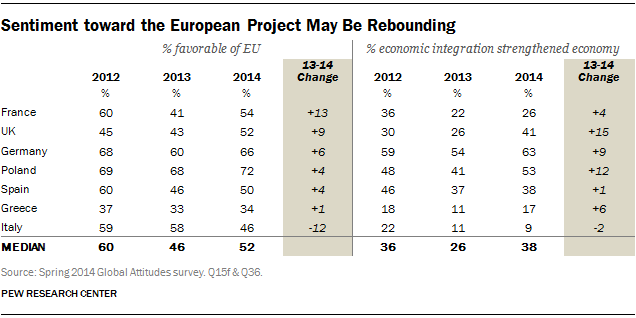
The euro crisis that began in 2008 dealt a savage blow to the image of the European Union. Between 2007 and 2013, EU favorability fell by 34 percentage points in Spain, 21 points in France and 20 points in Italy.
But views of the EU and the European project may have begun to recover in the past year. Median EU favorability across the seven countries is up from 46% in 2013 to 52% in 2014, led by a 13-point improvement in French opinion. Median belief that European economic integration strengthens a person’s national economy also increased, from 26% to 38%, driven by a 15-point increase in the UK and a 12-point rise in Poland.
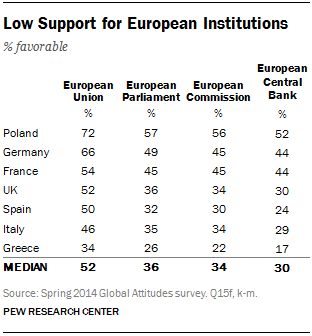
Support for the euro, Europe’s common currency, remains strong; large majorities in Germany (72%), Greece (69%), Spain (68%) and France (64%) want to keep it as their currency. Only Italians flirt with leaving the euro area – 44% now want to return to using the lira.
The principal institutions of the European Union do not fare nearly as well with the public, however. A median of just 36% express a positive view of the European Parliament. A median of only 34% say the same about the European Commission. And a mere 30% have a favorable view of the European Central Bank. Poles hold the EU and all its institutions in the highest regard. Greeks are the most critical.
And Europeans despair about their personal interaction with the EU. Majorities in all seven countries surveyed think their voice does not count in the EU. Italians (81%) and Greeks (80%) are particularly disheartened.
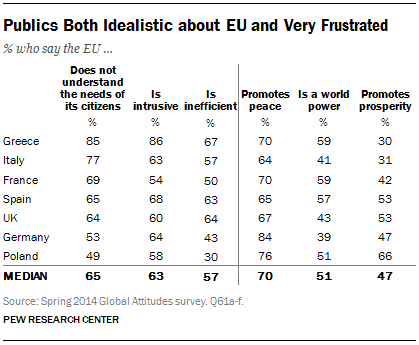
A median of 65% say the EU does not understand their needs, including 85% in Greece and 77% in Italy.
Moreover, a median of 63% see the EU as intrusive, a trait that Greeks (86%) find particularly galling. But that is a sentiment shared by more than half the public in the other six countries surveyed. And a median of 57% hold the view that the EU is inefficient, a sentiment held by majorities in four of the seven countries.
Despite these reservations, however, many Europeans still maintain an idealistic vision of the European Union, holding on to views reminiscent of the ambitious goals propounded by the creators of the European Common Market more than a half century ago. A median of seven-in-ten think the EU promotes peace, with Germans (84%) and Poles (76%) the most likely to hold that view. About half see the EU as a world power (51%), with the publics in France (59%), Greece (59%) and Spain (57%) most supportive of this opinion.
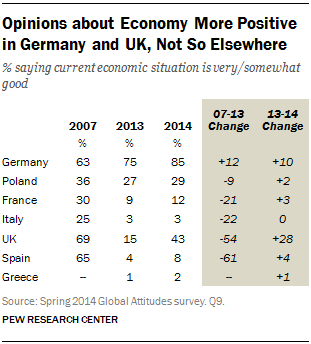
But less than half the public in four of the seven countries – including less than a third in Greece (30%) and Italy (31%) – buy the argument that the EU promotes prosperity. Such sentiment underscores the continued debilitating effect that Europe’s abysmal economic performance over the past few years has had on attitudes toward the European project. In most of the countries surveyed, views about the economy and the direction of the country remain negative and largely unchanged since 2013.
A median of just 22% are satisfied with the way things are going in their country. The least pleased are Greeks (5%), Spanish (8%), and Italians (9%). Only in Germany (59%) does more than half the public say their nation is headed in the right direction. For the most part, sentiment about economic conditions tracks views on country direction. The proportion of the population that says the economy is faring well is in single digits in Greece (2%), Italy (3%) and Spain (8%).
Between 2007, before the crisis, and 2013, positive assessments of the economy fell 61 percentage points in Spain, 54 points in the UK, 22 points in Italy and 21 points in France. But such gloom may have bottomed out in many nations in the past year. Again it is Germans who are the most upbeat, with 85% saying their economy is performing fine, a dramatic improvement from the 28% registered in 2009. And the proportion of British who give their economy a thumbs up has nearly tripled in the past year.
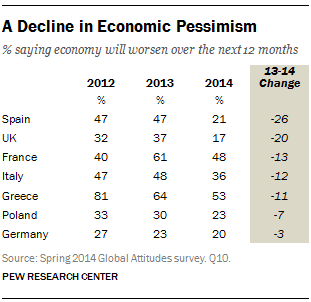
There has also been a marked decline in hopelessness: a new public sense that the worst is now over. The proportion of those surveyed who say their economy will worsen over the next 12 months has declined in the past year by 26 points in Spain, 20 points in the UK, 13 points in France, 12 points in Italy, 11 points in Greece and seven points in Poland.
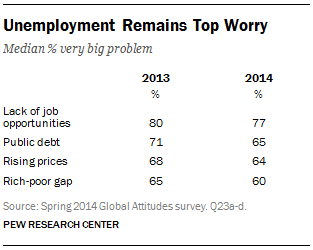
People still complain about specific economic problems, however. A median of 77% say a lack of job opportunities is a very big challenge. And six-in-ten or more see public debt (65%), rising prices (64%) and the gap between the rich and the poor (60%) as very big problems. But all those concerns are stable or down from last year.
Most notably, as inflation has slowed in Europe, concern about rising prices has fallen by 13 points in Poland and eight points in Germany. And it is the once-inflation-phobic Germans who now have the least concern, with only 23% saying rising prices are a very big problem.
Attitudes toward immigrants and minority groups also shape the public mood in the run-up to the parliamentary election. A median of 55% want fewer immigrants admitted to their country. This includes particularly strong anti-immigrant sentiment in Greece (86%) and Italy (80%). A median of 52% say immigrants are a burden because they take jobs and social benefits, 48% complain they want to be distinct from the local society, and 36% say they are to blame for crime. People on the right of the political spectrum are generally more critical of immigration.
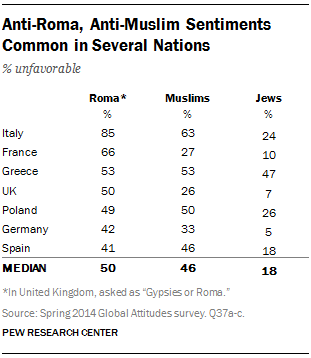
Views of minorities vary widely, both between countries and about specific minority populations. Roma are viewed unfavorably by a median of 50% of those surveyed, with Italians (85%) holding particularly negative sentiments. A median of 46% hold anti-Muslim views. Again it is Italians (63%) who see Muslims in the most negative light. And Jews are seen negatively by a median of 18%, with Greeks (47%) harboring the strongest anti-Jewish sentiment. Negative sentiments about all three groups are consistently more common among people on the ideological right.
Turnaround in the UK
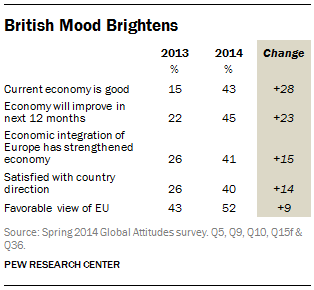
There has been a dramatic turnaround in the British mood in just the past year. Thanks in part to a rebounding economy, 43% of the public say the nation’s economy is now doing well, up 28 points since 2013. And 45% expect continued improvement, up 23 points from the optimism expressed last year. Just 17% expect the economy to worsen and an improved economic outlook may have bolstered support for the European project: 52% of the British public now has a positive view of the European Union. And belief that European economic integration has been good for the UK is up by 15 points.
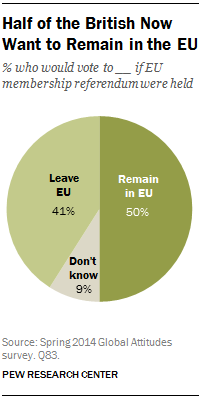
And with this turnaround, British support for remaining in the European Union has picked up. By 50% to 41%, the British now want to remain in the EU. In 2013 the public was divided, with 46% wanting to stay and an equal share wanting to leave.
Poland’s Love Affair with the EU
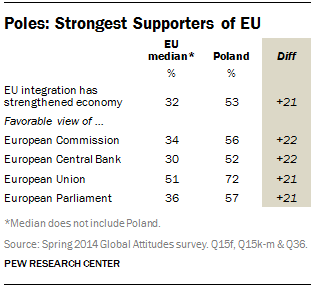
Among all the European publics surveyed, Poles are on balance the most committed to all aspects of the European Union. Roughly seven-in-ten Poles (72%) have a favorable view of the Brussels-based institution, compared with a median of 51% in the other six member states surveyed. Roughly half of Poles (52%) hold the view that European economic integration strengthened their economy, compared with a median of only 32% elsewhere. Half or more of Poles give a thumbs up to the European Parliament (57%), the European Commission (56%) and the European Central Bank (52%). In each case, such backing is more than 20 points stronger than median favorability across other EU societies.
Italians’ Sour Mood
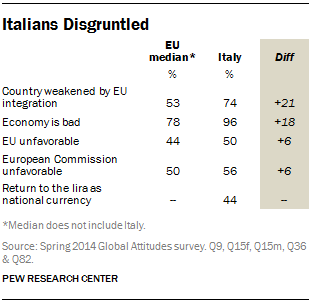
Italy’s continuing economic woes and political dysfunction have contributed to growing public disgruntlement across the board.
Almost all Italians (96%) say their economy is performing poorly, and about three-quarters (74%) say economic integration has weakened Italy’s economy. Half of the Italian public has a negative view of the EU, second only to Greece in disfavor toward the Brussels-based institution, and only 46% of Italians have a favorable opinion of the EU, the first time that measure has dipped below the break-even point since the euro crisis began.
And 56% voice disapproval of the European Commission. Moreover, 44% want to abandon the euro and return to using the lira; that’s a 19-point drop in support of the common European currency in just one year.
Germany: A Nation Apart
Stark attitudinal differences continue to differentiate Germans from other Europeans. Germans are 75 percentage points more likely than the median of the other six European nations to say their economy is doing well and 31 points more likely to think their country has been strengthened by economic integration with the rest of Europe.
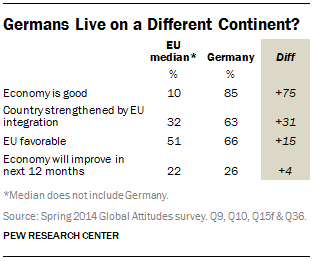
Roughly two-thirds of Germans (66%) have a favorable impression of the EU, compared with just half the publics in the six other EU nations surveyed. They are more inclined to complain that Brussels has already provided other EU countries with too much financial assistance. And Germans share with other Europeans the view that their voice is not heard in the EU. This may be one reason that opposition to giving more decision-making power to the EU has grown in Germany from 44% in 2013 to 50% in 2014.




